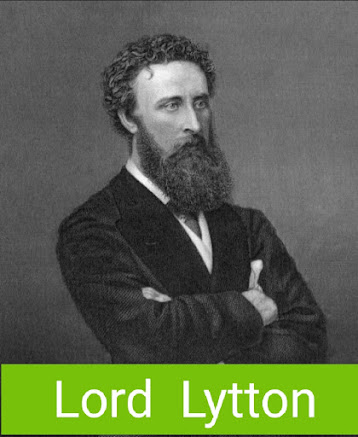Governor General Lord Lytton’s Home and Foreign Policy
Lord Lytton was sent by Disraeli’s Conservative Government keeping in mind the developments in Central Asia as Governor General in India. Disraeli’s letter to Lytton is particularly noteworthy, in which Lytton was mentioned what to do–“The thought state of Central Asia needs a politician and I believe that if you hold this high office Then you will get such an opportunity that you will not only serve the country but will also be able to become the worthy of everlasting fame.
When did Lord Lytton become the Viceroy of India?
In April 1876, Lord Lytton assumed the charge of his office from Lord Northbrook. Lytton was a diplomat by nature, having served in several positions in the British Foreign Office.
He was a noted poet, novelist and essay writer and was known in the literary world as “Oven Meredith”. Lytton had no knowledge of Indian conditions till 1876 AD.
Read about lord William Bentick
Lord Lytton and Free Trade
The industrialists from Lancashire, England, were jealous of the cotton mills opening in Bombay and criticized the import duties on cotton mill goods in India.
The Lancashire vote was of great importance to Disraeli’s Conservative government, a resolution was introduced in the House on 11 July 1877 according to which “in the opinion of this House the duty levied on cotton goods imported into India which is certainly protective, healthy commerce policies”. is against and should be abolished as soon as the financial situation of India allows.”
The Government of India had to take a decision on this proposal. Bypassing the severe financial crisis caused by the famine, Lytton removed import duties on 29 items – which included sugar, logs, and other types of cloth.
Administrative Reforms of Lord Cornwallis
Financial Reform
Lord Mayo, while continuing the policy of financial decentralization, some more provisions were made in it. Provincial governments were empowered to spend on ordinary provincial services—land taxes, excise taxes, and excise, stamps, law and order, general administration, etc.
John Strachey, who was a financial member of the Viceroy’s Executive Council, tried to equalize the tax rate of the provinces salt. He inspired the Indian kings to give up the right to make salt in exchange for financial compensation. International smuggling of salt ended and the government started getting more tax from salt.
Famine of 1876-78
From 1876-78, India had to go through a severe famine. Madras, Bombay, Mysore, Hyderabad, parts of central India and Punjab were the major affected areas.
The effect of the famine was on 5 crore 80 lakh people and its effect was on an area of 257000 square miles.
According to Ramesh Chand Dutt, 50 lakh people died in a year.
In 1878 a Famine Commission was set up with John Strachey as its chairman.
This commission suggested the formation of a famine fund in each province.
Said to give free assistance only to handicapped and helpless and poor. Asked to give adequate work and wages to the healthy body. He asked to pay attention to the development of canals and railways.
India Council Act 1909 -| Birth of communal division in India | 1909 Marle-Minto Act
Royal Title Act 1876
The English Parliament conferred the title of Kaiser-i-Hind on Queen Victoria by an act.
A grand Durbar was organized in Delhi on 1 January 1877. All this happened when the country was in the grip of severe famine.
Indian Language Newspaper Act March 1878 | Varnacular Press Act 1878
The Vernacular Press Act was enacted in 1878 to curtail the freedom of the Indian language (i.e., non-English) press in British India. Proposed by Lord Lytton, the then Viceroy of India (ruled in 1876–80), the act was intended to prevent the vernacular press from expressing criticism of British policies—in particular, the opposition to the Second Anglo-Afghan War. evolved from the beginning. 1878-80). The Act excluded English-language publications. It received strong and sustained opposition from a wide spectrum of the Indian population.
This law was repealed in 1881 by Lytton’s successor, Lord Ripon (1880–84). The outrage caused by this abhorrent law among Indians became one of the catalysts that gave rise to India’s growing independence movement. Among the most vocal critics of the Act was the Indian Association (founded 1876), which is generally regarded as one of the forerunners of the Indian National Congress (founded 1885).
Arms Act 1878.
The act made the possession of weapons in traffic without a license a criminal offence. The Act was opposed mainly on the grounds that it smacks of racial discrimination as Europeans, Anglo-Indians and certain other categories of government officials shied away from the operation of the Act.
Statutory Civil Service.
The Charter Act of 1833 provided for the holding of a competitive examination in London for recruitment to the higher service under the Company. Lord Lytton was also of the same mindset and wanted to completely close the doors of contract service to the Indians. Failing to do so, he planned to reduce the maximum age from 21 to 19 years to discourage Indians from competing for the said exam. All this was done to prevent Indians from appearing in this examination.
In 1864, the first Indian was Satyendranath Tagore who joined the Indian Janpad Service.
From 1862 to 1875 only 50 Indians appeared in this examination and only 10 were successful.
Second Afghan War, 1878,
Lytton instigated a senseless war with the Afghans with a view to establishing a scientific frontier to the north-west. This wild adventure proved to be a failure, while the government ruined millions of people who had been extorted from poor Indians.
